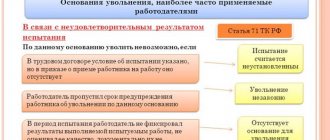General grounds and procedure for dismissal
Russian labor legislation allows a citizen to initiate termination of an employment contract at any time; to do this, it is enough to write a corresponding application and work for the next two weeks.
In most cases, a citizen is not obliged to explain the reasons for his decision; dismissal without the consent of the employer is a normal, legal practice. The employer does not have such freedom of action and does not have the right to dismiss employees without reason - he needs legitimate justification to terminate the contract. The list of acceptable reasons for dismissing a citizen is listed in the Labor Code of the Russian Federation, which defines how an employee can be dismissed without his consent and what procedure must be followed. The legitimate reasons include the following:
- inconsistency of the employee with the position held - clause 3, part 1, art. 81 Labor Code of the Russian Federation;
- failure by a citizen to fulfill the labor duties assigned to him - clause 5, part 1, art. 81 Labor Code of the Russian Federation;
- gross disciplinary violation - clause 6, part 1, art. 81 Labor Code of the Russian Federation;
- loss of trust - clause 7, part 1, art. 81 Labor Code of the Russian Federation;
- failure to complete the probationary period - Art. 71 Labor Code of the Russian Federation;
- liquidation of a company or reduction of staff - clauses 1 and 2 of Part 1 of Art. 81 Labor Code of the Russian Federation;
- refusal of a citizen to change the conditions established by the employment contract - clause 7, part 1, art. 77 Labor Code of the Russian Federation.
For each reason for compulsory dismissal, there is a specific procedure, strict compliance with which is the employer’s responsibility. Regardless of the reason for dismissal, the fact of termination of employment relations with a citizen is formalized by an appropriate order.
Table: employee compensation for dismissal without consent
| Type of payment/compensation | When provided | Note |
| Calculation for actual time worked | In all cases, less damage caused | — |
| Vacation compensation (unused) | In all cases, less damage caused | For those who signed an agreement for 2 months or less, as well as for workers hired for a season, the payment is calculated according to the following scheme: 2 days of vacation for each month worked |
| Severance pay - average earnings for 2 weeks (Article 296 of the Labor Code of the Russian Federation) | For seasonal employees: — upon liquidation of the organization; - during staff reduction | Compensation: - is not paid to employees who have entered into an employment contract for a period of up to two months, unless otherwise established by federal laws or the employment contract (Article 292 of the Labor Code of the Russian Federation); - not paid upon dismissal for guilty actions and if, through the fault of the employee, the rules for concluding an employment contract were violated; - not paid to part-time workers |
| Severance pay in the amount of average monthly earnings (Article 296 of the Labor Code of the Russian Federation) | For permanent employees: — upon liquidation; - when reducing staff | Similar to the previous point |
Position mismatch
Inconsistency with a position should be understood as the employee’s lack of competencies, knowledge, and experience necessary for his position. Is it possible to dismiss an employee without his consent if he does not suit the employer professionally? It is described in parts 2 and 3 of Art. 81 Labor Code of the Russian Federation. To formalize dismissal on this basis, a simple opinion of the manager about the employee’s competencies is not enough. Before terminating the contract, you must:
- Conduct a commission certification of a citizen and, with its help, make an objective verdict on the suitability or non-compliance of his position. Certification is carried out with the participation of the company's trade union body.
- If an employee is found not to be suitable for the position, he should be offered another position available in the company for which he is suitable.
- Only if there are no vacant suitable positions in the organization or if the employee has officially refused the employer’s offer, dismissal for lack of suitability is allowed.
Read more: How to fire an employee who does not meet qualification requirements
How legal is dismissal?
The State Labor Inspectorate periodically checks to what extent the termination of the employment agreement was complied with according to the law. This may happen:
- As a result of the dismissal filing an appeal to the relevant authorities.
- At the request of the state prosecutor.
- As part of a planned inspection of the enterprise.
If, based on the results of the audit, it turns out that the worker was fired illegally, certain sanctions will be applied to the employer. Often an administrative fine is imposed on the organization and its management. In addition, the employer will be required to reinstate the employee and pay for his temporary absence from the workplace. Sometimes the court awards additional monetary compensation to the employee as payment for moral damages.
Please note: administrative fines for management are equal to 1-5 thousand rubles, and for an enterprise - up to 50 thousand rubles. In case of systematic violations, the employer may be suspended from his position for up to 3 years.
Having decided to dismiss an employee without his consent, the employer should take into account all the nuances of completing this procedure. Otherwise, the worker will be able to prove the illegality of the dismissal.
Failure to fulfill duties
The procedure for dismissal without the consent of an employee due to his failure to fulfill his duties is described in paragraphs 33 and 35 of the Resolution of the Plenum of the Supreme Court of the Russian Federation dated March 17, 2004 No. 2.
The document specifies that failure to fulfill duties should be established if a citizen violates:
- legal requirements;
- obligations under the employment contract;
- internal labor regulations;
- job description;
- regulations, orders or other official documents of the employer.
An important condition for the application of this ground for dismissal is the repeated failure to fulfill duties: in the event of primary failure, termination of the employment contract is unacceptable, and the violator should be subject to disciplinary action. But if a citizen repeatedly fails to fulfill his duties before the expiration of the disciplinary sanction, the employer has grounds for dismissal.
Even in this case, dismissal is preceded by an internal investigation designed to establish the degree of guilt of the employee. As part of such an investigation, written explanations must be taken from the employee.
Read more: Procedure for applying disciplinary sanctions
How to confirm pre-retirement status
The fact that a person is already about to retire is confirmed by passport data. In addition, a pre-retirement person can receive a special certificate issued by the Pension Fund. In accordance with the Resolution of the Board of the Pension Fund of the Russian Federation dated April 4, 2019 No. 206p, a certificate can be obtained in several ways:
- by requesting it in person or by mail at the territorial office of the Pension Fund of Russia;
- by sending a request through the MFC;
- via the Internet - by submitting a request on the government services portal or in your personal account on the Pension Fund website.
The period for issuing a certificate is 3 working days. When applying online, you do not need to submit any documents. If applying in person, you will need a passport.
A pre-retirement certificate is issued free of charge.
One-time gross violation
Separately, the Labor Code of the Russian Federation identifies a list of offenses, the single commission of which is sufficient to dismiss an employee:
- absenteeism;
- showing up at work under the influence of alcohol or drugs;
- disclosure of state, commercial or official secrets, if the employee gained access to it in connection with his official duties, the list of protected information also includes personal data of other employees;
- theft;
- violation of labor protection requirements, if it resulted in serious consequences, for example, an accident, breakdown or catastrophe.
Before formalizing the dismissal of an employee without his consent, the company administration is obliged to take preliminary measures, including:
- Request an explanation from the employee.
- Obtain a medical report on the employee’s condition if we are talking about appearing under the influence.
- Obtain a conclusion from the labor protection commission about the fact of violation.
Read more: How to file for dismissal for absenteeism
How can a pre-retirement employee be legally refused employment?
Since there are no clear definitions in the law, there are at least 3 legal ways not to hire an elderly person:
- A pre-retirement employee is not suitable for the vacancy based on the business qualities specified in the job description by the employer (and a lot can be specified there).
- The person does not meet the requirements of professional standards (although the employer must officially introduce them). By the way, the employer may introduce additional requirements to professional standards - for example, employees need to know Chinese if the company cooperates with representatives from China. That is, requirements can be prescribed that are obviously impossible for most people to meet.
- The applicant does not qualify for the position due to health reasons (if the job involves increased demands on well-being, physical capabilities, etc.). And even if you are sent for a medical examination, in most cases there is no hope that an elderly person is in perfect health.
Loss of trust
As explained in paragraph 45 of the Resolution of the Plenum of the Supreme Court of the Russian Federation No. 2, employees who service cash or commodity assets, for example, cashiers, storekeepers or salespeople, are fired on this basis.
The basis is that such an employee committed an act because of which the employer doubted his cleanliness and honesty. Such offenses include failure to comply with the rules for working with cash registers or shortages.
When planning to fire an unwanted employee without his consent due to loss of trust, it is important to remember that an internal investigation will be required and written explanations will be required from the employee.
Read more: How to file a dismissal due to loss of trust
On what grounds can you dismiss an employee without his consent?
(Article 25 of the Labor Code of the Russian Federation). It should be taken into account that the employer’s actions to change significant working conditions can be challenged by the employee in court. If the court finds that the change was made by the administration not in connection with changes in the organization of production and labor, then such a change, taking into account specific circumstances, may be declared unlawful by the court, imposing the obligation on the employer to restore the previous conditions.
A one-time gross violation of labor duties by the head of an enterprise, institution, organization (branch, representative office, division and other separate division) and his deputies (clause 1 of Article 254 of the Labor Code of the Russian Federation).
A single gross violation of labor duties is considered to be a guilty, illegal action that causes material damage to the enterprise or its employees. For example, the established fault of the manager in the production of low-quality products by the enterprise, as a result of which it suffered losses.
Dismissal on the basis provided for in paragraph 1 of Article 254 of the Labor Code of the Russian Federation is one of the types of disciplinary sanctions, therefore it must be carried out in compliance with the procedure provided for in Article 136 of the Labor Code of the Russian Federation.
Commitment of guilty actions by an employee directly servicing monetary or commodity assets, if these actions give rise to a loss of confidence in him by the administration (clause 2 of Article 254 of the Labor Code of the Russian Federation).
Direct servicing of monetary and commodity assets means their transportation, distribution, reception, and storage. Guilty actions are usually understood in this situation as violation of the rules for accounting and storage of valuables. Such actions may include, in particular: using property entrusted to an employee for servicing for personal purposes, measuring, weighing, counting, receiving payment for services without completing the appropriate documents, violating the rules for the sale of alcoholic beverages or dispensing narcotic drugs, etc.
Accountants cannot be fired due to loss of confidence (unless they also hold the position of cashier), since material assets are not directly entrusted to them.
Loss of trust on the part of the administration must be based on objective evidence of the employee’s guilt in causing material damage or committing illegal actions. If the employee’s guilt in committing specific actions has not been established, then the employee cannot be dismissed on the grounds of loss of trust, despite the occurrence of a shortage, damage to entrusted valuables, etc.
Failed test
A probationary period is a period during which the employee and employer evaluate each other. During this period, both the employee and the company administration have the opportunity to terminate the relationship much faster than usual. For employers, this is one of the few options for quickly dismissing an employee without his consent: it is enough to send the employee written notice before the expiration of the trial, no later than three days before the expected termination of the relationship.
In the notice, the employer explains the reasons for this decision. A dismissed citizen has the right to appeal it in court.
Read more: If the employee has not completed the probationary period
Company liquidation and downsizing
The Labor Code of the Russian Federation provides for cases when an employee is fired not due to his personal qualities or behavior, but because of processes occurring at the employer, in particular, in the process of liquidation or staff reduction.
In both cases, the employee must be notified no later than two months before the proposed dismissal.
If there is a reduction in staff, it is important to remember that the employer does not have the right to terminate the contract without offering the dismissed person alternative vacancies that this employee could fill.
Read more: How to fire a person without his consent to reduce staff
Read more: Labor relations in case of bankruptcy of an enterprise
Changes in working conditions
As a general rule, an employment contract is changed only by agreement of the parties - the employer does not have the right to force an employee to sign changes. However, if changes to the contract are required due to significant changes at the employer, in particular, changes in organizational or technological working conditions, the employer has the right to send the changes to the employee and require them to be signed. This must be done no later than two months before these changes occur.
If the employee does not agree with the proposed changes, before dismissing the employee without his consent, the company is obliged to offer him an alternative vacant position that matches his professional skills. If there is none, or if the employee is not ready to move to the proposed position, the dismissal procedure begins.
Read more: Procedure for making changes to the terms of an employment contract
How can you fire an employee without his desire according to the law?
How to fire a negligent employee without his desire
The grounds for dismissing employees are given in the Labor Code of the Russian Federation, but the Labor Code does not give a full answer to the question of how to dismiss an employee without his desire according to the law?
They can be divided into groups: the employee’s own desire, the employer’s initiative and circumstances beyond the control of either the employer or the employee.
In most cases, the dismissal of employees solely at the initiative of the employer is associated with unsatisfactory results of their work due to non-compliance with job duties, violations of labor discipline or low qualifications.
What grounds give an employer the right to get rid of an unscrupulous employee? What difficulties may an employer encounter when an employee does not agree with the dismissal and challenges its legality? How to fire a work colleague?
List of required documents
Below is a list of documents required to dismiss an employee without his desire, but without violating the law.
- A dismissed employee has the right to demand from the company:
- A copy of the employment contract;
- Dismissal order
- Copies of documents confirming contributions to pension and other social services. funds
- A document confirming the position held by the employee with a fixation of the time period spent during the performance (hiring date, dismissal date).
What you need to pay attention to when deciding to fire an employee
What you need to pay attention to when making a decision to dismiss at the initiative of the employer
The dismissal of an employee by decision of the employer will be legal and justified if the following criteria are met:
- the actual existence of the conditions for dismissal established in the Labor Code;
- strict adherence to all procedures related to dismissal: obtaining explanations, delivering notices, agreement with the trade union body, etc.
The absence or failure to comply with any of these criteria in the event of a dispute will entail automatic recognition of the illegality of dismissal and will be the basis for reinstatement of the employee.
In the event of a reduction in staff or numbers, as well as liquidation of an organization, notice of the upcoming dismissal must be given to the employee at least two months in advance.
Warning! The warning is given against signature, and in the event of the employee’s absence for valid reasons, it can be sent to the place of residence by registered mail.
act of refusal to familiarize
If an employee is not suitable for his position due to low qualifications, he can be dismissed only if such a discrepancy is established by the conclusion of the certification commission and only after a reasoned opinion has been received from the trade union organization and taken into account.
In case of repeated failure to fulfill official duties, dismissal is possible if there is a reprimand or reprimand previously announced to the employee, as well as documentary evidence of the facts of his failure to fulfill official duties: memos, explanatory notes, complaints, etc.
Such dismissal, being a disciplinary sanction, must be carried out in compliance with the procedures prescribed by the Labor Code of the Russian Federation (Articles 192 and 193): the severity of the offense must be assessed, an explanation in writing must be received from the employee, which he must submit within a period not exceeding two working days.
The decision to dismiss cannot be made earlier than the deadline provided for giving an explanation. Refusal to provide an explanation or failure to provide it must be documented in an act.
In case of a single gross violation of official duties, absenteeism, disclosure of official secrets, violation of labor safety rules, or being intoxicated at work, dismissal as a disciplinary sanction cannot be carried out without following the procedures prescribed by the Labor Code of the Russian Federation (Articles 192 and 193).
The employer does not have the right to independently establish the facts of theft of someone else's property or the falsification of provided documents. To dismiss on such grounds, the employer must obtain a court decision or sentence or a resolution of an administrative body that establishes these circumstances.
Thus, an employer who has decided to fire a negligent employee must comply with the following rule: the violation identified must be documented, an assessment of the severity of the violation must be made so that the punishment in the form of dismissal is adequate to the misconduct, and deadlines must be met.
Who cannot be fired without consent
You cannot forcibly dismiss an employee who is on vacation or sick leave. In addition, Art. 261 of the Labor Code of the Russian Federation prohibits dismissal at the initiative of the employer:
- pregnant women - except in cases where dismissal is made in connection with the liquidation of the company;
- sole breadwinners of large families;
- single mothers with children under 14 years of age;
- women with children under three years of age;
- mothers and fathers of disabled children under the age of 18, if they are their sole breadwinners.







